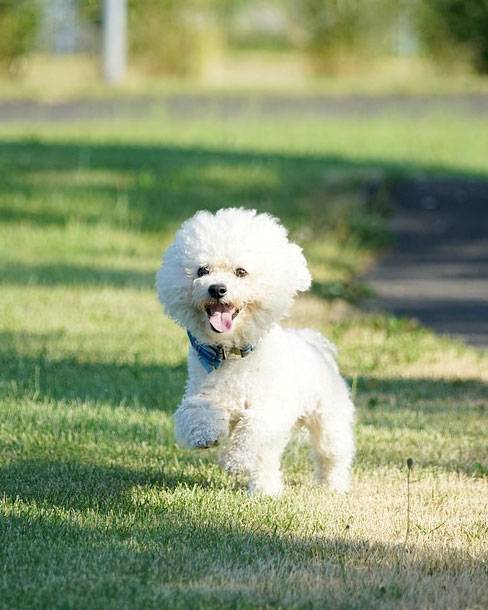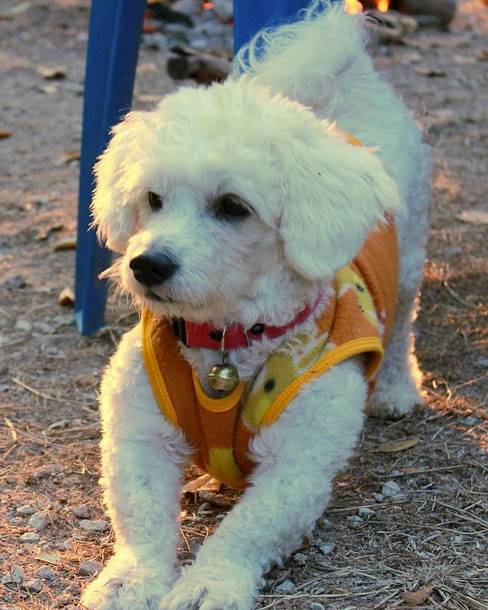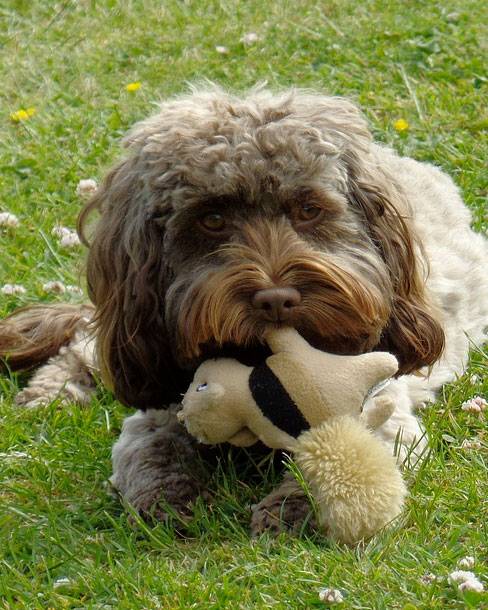Both the Cockapoo and Bichon Frise are breeds that are very affectionate with their family. They are true companion dogs that love to play. So how do you decide which breed is a better fit for your family? Let us help you answer that question. Here is an overview of the similarities and differences between a Cockapoo and Bichon Frise.
Cockapoo or Bichon Frise – Lets Take A Closer Look
Contents and Quick Navigation
Cockapoo vs Bichon Frise: How Similar Do They Look?
Both Cockapoo and Bichon Frise have floppy ears. That’s about the only true similarity between these two dog breeds. Since the Cockapoo is a mixed breed, they have a greater mix of characteristics than the Bichon Frise.
Landing on cockapoohq.com means that you probably already know your fair share about Cockapoo looks. So, let’s take a look at the Bichon Frise.

The Bichon Frise is smaller than most Cockapoos. At their tallest, a Bichon Frise is still a couple inches shorter than an average height Cockapoo. They were bred to be lap dogs, after all.
Another difference between these breeds is the coat. The Bichon Frise is one of the many small dog breeds that has white curly hair. The Cockapoo’s coat is usally more wavy and is not necessarily white.
Which Breed is Easier to Groom?
A Cockapoo is easier to groom than a Bichon Frise.
A curly haired dog requires a bit more brushing than breeds that have short coats. A Bichon Frise needs daily brushing to keep their hair from becoming matted. Brushing is very important because their dense coat traps loose hair. This is the reason why they are considered a low-shedding breed.
Other than daily brushing, their coat requires a trim about once a month and watch out for their eyes becoming stained. You can time this along with their monthly bath. The Bichon Frise is quite a clean dog so unless they love to get dirty outside, you won’t have to bathe them too often.
Characteristic of many Bichon Frise pooches is their afro. Some owners choose to have the afro so full that you can’t see their ears. This is a personal choice but do remember to brush their ‘fro daily. Matted and tangled hair, especially around the eyes can cause health issues later on.
Which Breed Is Easier to Train?
Both breeds have an easy to train temperament.
Both breeds are attentive and seek the love of their owner. This makes them relatively easy breeds to train. However, how obedient a dog is has a lot to do with socialisation and consistency from an early age. Misbehaviour is an unlikely problem with steady training.
Introduce your pup to strangers and other doggos from as early as 8 weeks old. However, only bring puppies in contact with vaccinated dogs. Puppies are still very susceptible to diseases before they complete their vaccinations. During this socialisation stage, never place your dog on the floor in public areas and only let the puppy be in the same room as fully vaccinated dogs.

There are two specific things to note about training a Bichon Frise, though. The first one has to do with their social nature. A Bichon Frise does not do well on its own. If they are left alone for a long period of time they can misbehave out of anxiety. This breed is a true companion dog that needs their human companion next to him as much as possible.
Another common issue with the Bichon Frise is potty training. For some reason, this breed tends to need a longer time for housebreaking. Stay patient and remember that positive affirmation always works better to train a dog. This is a common puppy problem that is solved with proper training.
How Much Exercise Do These Dog Breeds Need?
The Bichon Frise does not need as much exercise as the Cockapoo since they generally have less energy.
A Bichon Frise is definitely playful but they also love to take naps. These little dogs are content with a short daily walk and a few minutes of games each day. When they get excited, these pooches have a whole lot of energy but these bursts do not last for very long. They prefer spending most of their day lounging around.
Playtime is important for the Bichon Frise to feel connected to their family. Remember to schedule in a few minutes of play each day to keep your four-legged buddy happy. Though generally calm dogs, they do need an outlet for their energy.
Are There Any Health Issues Associated with Bichon Frise?
Compared to the Cockapoo, there are more health risks to look out for with a Bichon Frise. Though still a generally healthy dog, the list of associated diseases is longer.
Breed specific health issues of the Bichon Frise are;
Legg-Perthes: a hip deformity most common in puppies.
White Shaker Disease: common amongst all small white dogs. This treatable disease sees the dog shake its head uncontrollably during sleep or walking.
Weight Issues: like other small white dogs, the Bichon Frise is prone to being overweight and can suffer from diabetes. Stick to a healthy diet with enough exercise to avoid this problem.
Dental Disease: naturally having sensitive teeth and gums, these dogs need monthly teeth cleaning to prevent infections.
Cockapoo vs. Bichon Frise Summary
There are clear differences in appearance between the Cockapoo and Bichon Frise. The Bichon Frise needs more grooming with daily brushing, regular hair trim and monthly teeth cleaning.
Though neither dog is a difficult pet, the Bichon Frise is less adaptable. They are homebodies that need to be with their human as much as possible. Though easily trained, they can misbehave from anxiety when left alone for too long.

The Bichon Frise loves to play but their energy doesn’t last long. The Cockapoo is better suited for an active outdoors lifestyle.
Also, remember to look out for symptoms of common health issues and keep your Bichon Frise on a healthy diet.
Mike is the proud owner of a 7-year-old Cockapoo named Luna. He loves to share stories, tips and information about owning a Cockapoo. With over7 years of experience as an owner, Mike is passionate about helping others own and care for their dog.
Top 5 Popular Cockapoo Products
